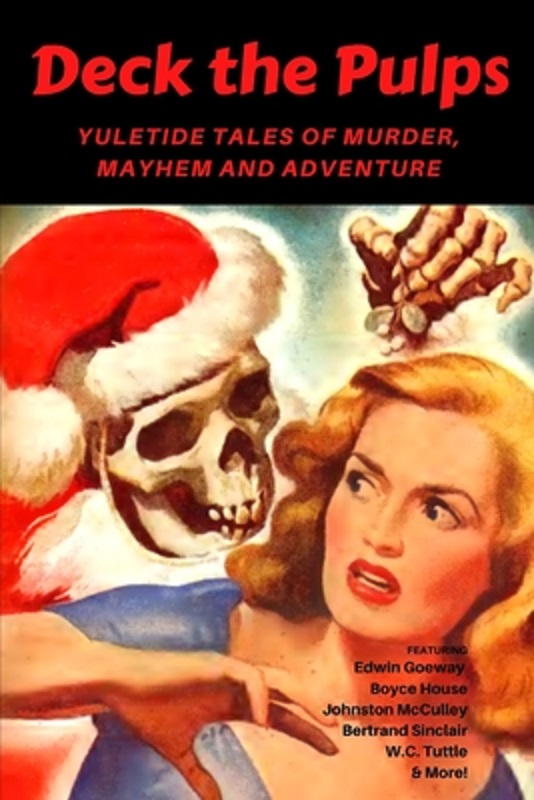Book Review: Deck the Pulps published by Brick Pickle Media
Pulp magazines, like most forms of media, liked to celebrate holidays. Such as, you know, Christmas. But being the pulps, they leavened the usual sentimentality of the season with more of their usual action and excitement. This set of nine tales covers a variety of genres and emotional approaches. Each story comes with a short introduction about the author.

“Death Plays Santa Claus” by Johnston McCulley opens the volume. The creator of Zorro also had several other series characters published in the pulps, including this story’s protagonist, police detective Mike O’Hara. A man is poisoned at a Christmas Eve party, and the only possible suspect is Santa Claus! Detective-Lieutenant O’Hara must solve the crime quickly, or miss his own family holiday. Outside the seasonal trappings, it’s a fairly standard detective tale.
“Wise Men and a Mule” by W.C. Tuttle enters into the spirit of festivity a bit more, as the wild Western community of Piperock tries to perform a Christmas pageant. Narrator Ike is strongarmed into playing one of the title wise men, and cantankerous mule Maud S is drafted for the part of camel. Hilarity ensues. This is folksy humor with the “folksy” spread on thick with names like “Old Testament” Tilton and “Dirty Shirt” Jones. You might want to have it read to you by someone who can do a good Western accent.
“Johnny Kelley’s Christmas Ghost” by Antoinette Gregory as related by Edwin A. Goeway is in the fine tradition of Christmas ghost stories. The existence of Miss Gregory is…doubtful. She’s a charitable socialite who realizes she’s forgotten one of the poor children on her list. Can a ghost from her past help Antoinette bring a merry Christmas and a brighter future to a suffering boy? Well, yes, this is after all a Christmas story. A bit sappy.
“The Santa Claus Bank Robbery” by Boyce House goes clear in the other direction, as it’s a gritty “true crime” tale of modern Texas. A bank robber gets the bright idea of dressing up in a Santa suit to distract attention from his heavily armed confederates as they enter the bank. As so often happens, the first part of the plan went off swimmingly, and then things started falling apart when the robbers tried to leave the bank. Death and misery follow, and the robbers never get to spend a dime of their ill-gotten gains.
If you’d like to know more without buying this book, there’s a Wikipedia article. https://en.wikipedia.org/wiki/Santa_Claus_Bank_Robbery
“Christmas on Mars” by William Morrison (who later helped create J’onn J’onnz, the Martian Manhunter) is our science fiction entry for this book. Four juvenile delinquents on the Red Planet attempt to mug a “little guy” who turns out to be Michael Diston of the Interplanetary Police. Fortunately, it’s Christmas by Earth time, so he gets these dead end kids a decent meal, some presents, and brighter futures. The sentimentality is somewhat thinned by the reveal at the end that he killed one of their fathers in the line of duty.
“One Crowded Christmas” by Douglas Pierce has a feckless young man whose rich father has denied him a raise–with good reason–vow that he will venture out on his own to seek his fortune. But having done so, he realizes he’s out on the street on Christmas Eve with the clothes on his back and three dollars in his pocket. When he encounters a little lost boy, the man takes pity and spends his last cash getting the boy home. You might think he’d be rewarded for this good deed, but there are yet some twists in the tale. I liked this story the best in this collection.
“One Christmas” by Bertrand Sinclair is the story of a bank teller who might get into the high-paying positions by age 45, but wants to get married at age 29, when his hot but impoverished sweetheart is available. (Her father was ruined by the banks.) He comes up with a plan to steal a large sum of money and just maybe get away with it by taking advantage of the Christmas bank holiday. But can he truly pull it off? And can he live with himself if he does?
“Bonita” by Henry Herbert Knibbs is one of his “Overland Red” Western tales. Now a prosperous middle-aged rancher in California, Red’s mind drifts back to his wild and wooly youth as a gunslinger, and the Christmas he wooed the beautiful Bonita. Though the threat of violence is ever-present, Red manages to get through this incident without bloodshed. There’s a short coda in the present day when we learn how things turned out afterward. Red’s brand of religion is…idiosyncratic.
“Little Lost Brain” by Dorothy Dunn ends the volume with a more noirish tale. A brain surgeon examines a young woman to see if she’s a good candidate for pre-frontal lobotomy. She’s been acting oddly ever since the death of her uncle at that last Christmas party. This story was written in 1943, and makes no bones about the lobotomy procedure being controversial even then–it’s specifically compared to abortion. The surgeon is proud of his ability to perform such operations, but knows the side effects, so he must be absolutely sure before he goes in.
There’s a bit of clumsy editing where missing words were added in a different font than the main text in at least one of the stories.
Content note: suicide, children in peril, fat-shaming, lynching.
Overall, a fun collection of stories on a general theme that allow a sample of the different kinds of pulp. This would make a good holiday gift for the person in your life who gets a kick out of skeletons in Santa costumes.

